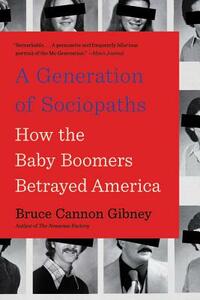Take a photo of a barcode or cover
198 reviews for:
A Generation of Sociopaths: How the Baby Boomers Betrayed America
Bruce Cannon Gibney
198 reviews for:
A Generation of Sociopaths: How the Baby Boomers Betrayed America
Bruce Cannon Gibney
slow-paced
3.5 stars. I would have given it 4 but the author crashed and burned in the very last chapter. The early chapters offer an interesting and well written breakdown of what's been happening in the last several decades. But in the last chapter, you can definitely tell he's a venture capitalist, since he ends the book arguing the poor and lower middle class need to pay more taxes, not the rich or corporations. He completely ignores the massive amounts of money hidden off-shores by both corporations and individuals, insisting that we lower their tax rates so that maybe they'll do so less and it'll all even out. If we're calling boomers sociopaths, you can't trust they'll do the right thing and stop evading the taxes they owe.
Some of the downgrading is also simply due to time. Even though this book wasn't written that long ago, it's already out of date with the revelations of Facebook and Twitter's misdeeds in spreading misinformation and hate, both in regards to the pandemic and insurrection on January 6th. It's not the author's fault he can't see the future but even in 2016/2017, these things were already obvious.
Finally, there's a distinct whiff of misogyny here and there, particularly with the outright condemning/blaming of bottle feeding children why boomers are sociopaths. Even if there are distinct advantages offered by breastfeeding, there are many valid reasons why some women don't and it's incredibly damaging to suggest otherwise.
Some of the downgrading is also simply due to time. Even though this book wasn't written that long ago, it's already out of date with the revelations of Facebook and Twitter's misdeeds in spreading misinformation and hate, both in regards to the pandemic and insurrection on January 6th. It's not the author's fault he can't see the future but even in 2016/2017, these things were already obvious.
Finally, there's a distinct whiff of misogyny here and there, particularly with the outright condemning/blaming of bottle feeding children why boomers are sociopaths. Even if there are distinct advantages offered by breastfeeding, there are many valid reasons why some women don't and it's incredibly damaging to suggest otherwise.
The first few chapters kinda covered it. Library took the loan back and I never finished it.
The book is an interesting framing of the rise to power of the Baby Boomer generation. The crux of the argument is that society created a sociopathic generation. Sometimes that's characterized as a bunch of sociopathic individuals, sometimes in diagnosing the generation with sociopathy.
I find the book interesting but flawed in the sense that there are no true comparisions for controls. Aside from the fact that the DSM is for diagnosing individuals and not generations... how sociopathic are other generations? Consider that if all generations were similarly greedy and seeking to benefit from society - but not as large as the baby boomers -they are then forced to work together. Many of the problems described seemed that they could be explained by the boomers just being too big to say "no" to. In that sense, it's actually more of a representation problem and dysfunction of government to deal with the massive cohort of similar individuals at the expense of the rest.
Ultimately, the fact that the following generations will have to step up is a reasonable conclusion. There are some interesting takes on history that are covered - but it does come across a bit as sowing the seeds of generational discord. In any case, we'll see how it all turns out.
I find the book interesting but flawed in the sense that there are no true comparisions for controls. Aside from the fact that the DSM is for diagnosing individuals and not generations... how sociopathic are other generations? Consider that if all generations were similarly greedy and seeking to benefit from society - but not as large as the baby boomers -they are then forced to work together. Many of the problems described seemed that they could be explained by the boomers just being too big to say "no" to. In that sense, it's actually more of a representation problem and dysfunction of government to deal with the massive cohort of similar individuals at the expense of the rest.
Ultimately, the fact that the following generations will have to step up is a reasonable conclusion. There are some interesting takes on history that are covered - but it does come across a bit as sowing the seeds of generational discord. In any case, we'll see how it all turns out.
I wanted to like this, believe me, if it meant I could understand another generation. But this is written like a high school paper with one claim and very VERY weak evidence to support it. Honestly? It won’t surprise me if the author writes a book in a few decades about Generation Z being a “generation of histrionics” or something else that mocks psychology and research. DNF.
No class analysis, victim blaming, no understanding of trauma
informative
reflective
slow-paced
informative
reflective
medium-paced
informative
reflective
medium-paced







